What is egg freezing?
As women grow older, the quality and quantity of their eggs can decline; making it more difficult to have a baby with their own eggs. Egg freezing treatment empowers women to take control of their fertility timeline; allowing them the option to preserve younger, healthier eggs, which can be frozen for use when they’re ready to start their pregnancy journey.
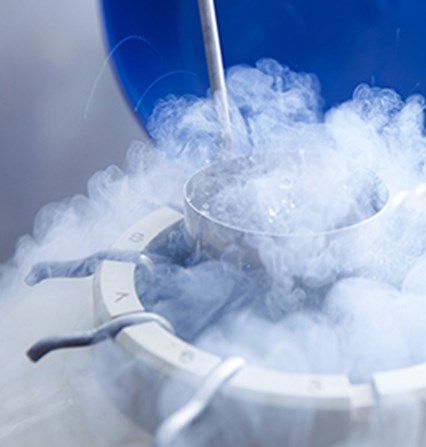
How does egg freezing work?
Similar to IVF, egg freezing involves stimulating your ovaries using medication to produce eggs. These eggs are then collected during a procedure and frozen in the laboratory using the latest technology called vitrification (fast freezing). When you wish to use these eggs to conceive in the future, the eggs will be thawed and fertilised in the lab. As the embryos grow, they will be carefully monitored, and the best quality embryo will be transferred into the womb after 3-5 days.
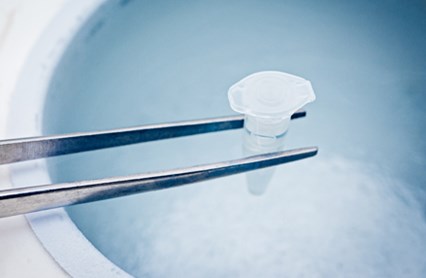
The egg freezing process
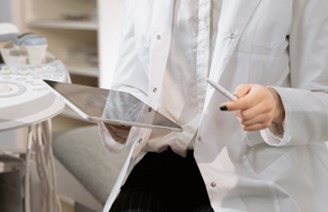
Step 1: Ultrasound scan
Firstly you will come to our clinic and have an ultrasound scan. This is where we will look at your follicles and assess your egg reserve and overall fertility. Based on this, we can make an assessment on how many eggs we are likely to collect, and potentially how many cycles of egg freezing would be optimum for you.

Step 2: Initial consultation
A few days later, you will have your virtual initial consultation with a nurse. Here we will discuss your medical history (including previous surgeries, illnesses and your menstrual cycle), we’ll discuss why you are choosing to freeze your eggs, and we’ll also talk you through the egg freezing process, success rates, potential risks and side effects. After this, you will receive a treatment plan including all potential costs for your treatment.

Step 3: Ovarian stimulation
Your treatment will be in line with your menstrual cycle. So, once you’ve decided you want to begin treatment, it will commence at the beginning of your next period. You'll undergo a course of injections to gently stimulate your ovaries. These medications, similar to natural hormones involved in ovulation, encourage the development of follicles (fluid-filled sacs) containing mature eggs. You’ll then receive regular monitoring through ultrasound scans and blood tests, allowing your nurse to track how your ovaries are responding and adjust the medication if needed.
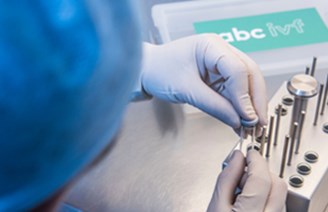
Step 4: Egg retrieval
Once the stimulation phase is complete and the follicles have reached optimal size, an appointment is booked for an egg retrieval procedure. This minimally invasive outpatient procedure is performed under light sedation for your comfort. A thin needle guided by ultrasound is inserted through the vagina and into the ovaries to collect the follicular fluid containing the eggs. The eggs are then examined by our embryologists to ensure their quality before the next stage — vitrification.
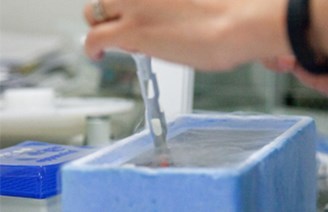
Step 5: Vitrification
While traditional freezing methods affected egg quality with ice crystal formation, a sophisticated technique called vitrification has emerged in recent years which improves egg freezing success. This rapid freezing process utilises a special solution to flash-freeze eggs at ultra-low temperatures (-196°C or colder) within a liquid nitrogen tank. Vitrification essentially suspends all biological activity, effectively placing the eggs in a deep freeze — preserving their viability for future use.
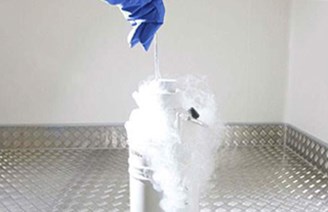
Step 6: Cryopreservation
The frozen eggs are securely stored in cryogenic tanks containing liquid nitrogen. These tanks maintain exceptionally low temperatures, creating a stable environment for long-term storage. Eggs can remain viable for many years under these cryopreserved conditions.
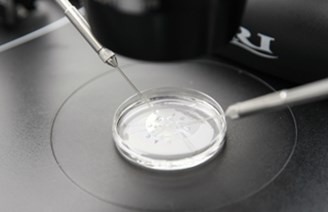
Step 7: Thawing and fertilisation
If and when you're ready to conceive using your frozen eggs, the eggs are thawed and meticulously evaluated for viability. If healthy eggs are available, they are combined with sperm through IVF. During IVF, fertilisation occurs in a controlled laboratory setting. If fertilisation is successful, healthy embryos will develop.

Step 8: Embryo transfer
The highest grade embryo is chosen for transfer. A thin catheter is used to carefully place the embryos into your uterus. If implantation occurs, a pregnancy can develop and progress naturally, similar to a natural conception.
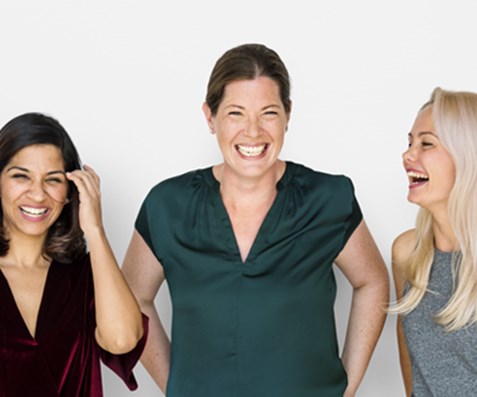
Who is egg freezing suitable for?
Women choose to freeze their eggs for a variety of reasons. Some may not feel quite ready to start a family yet, perhaps because they haven't found the right partner or need to focus on their career goals. Egg freezing allows women to preserve their fertility by storing their eggs when they are younger and healthier. This can help improve their chances of having a baby when they are ready to take that step.
Success rates for pregnancy with IVF are highest when using eggs retrieved from younger women. Fertility naturally declines with age, as the quality and quantity of eggs decrease. Therefore freezing your eggs in your 20s or early 30s offers the best chance of future success.
What are the success rates of egg freezing?
The success rates of egg freezing and thawing have increased, particularly following the development of vitrification technology.
Eggs frozen using vitrification have a higher survival rate — up to 80% of frozen eggs now survive thawing. This high survival rate can help increase the success of conceiving when using thawed eggs in the future. For women who freeze their eggs under the age of 35, the live birth success rate per embryo transferred is up to 40% and for women who freeze their eggs in their late 30s or early 40s, the success rates could be in single digits.
As with any fertility treatment, egg freezing success rates depend on several factors, including the age of the woman at the time of freezing. The optimum age to freeze your eggs is in your 20s or 30s, when egg quality and quantity tend to be best, resulting in higher chances of success. However, it is important to check your individualised success rates with your fertility consultant before making a decision.

*What's included in our Egg Freezing package?
The package includes stimulation medication and monitoring blood tests, as well as:
- Treatment consultation
- Screening tests (Hepatitis B, Hepatitis C & HIV)
- Monitoring scans & blood tests (Oestradiol & Luteinizing Hormone)
- Ovarian stimulation and trigger medication
- Expert clinical advice
- Egg collection & sedation
- Follow up consultation
The package does not include annual storage, which is £395 per year. The estimated total cost for this package is £3,745. It is important to note that this cost may vary depending on individual needs. Additional medications, pre-treatment tests, storage fees, fertilisation procedures, and embryo transfer procedures are not included in the base price and will be billed separately when required.
Egg freezing treatment is also available from as little as £65 per month with our payment plan options. For more details visit our payment plans page.
Our egg freezing success stories
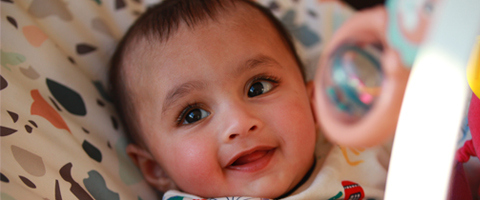
Sarath & Saritha's IVF story
I would definitely recommend abc ivf to anyone who needs fertility treatment because they helped me have a great journey. Dealing with infertility isn’t straight forward and all cases are different however I truly believe that a great clinic supports their patients and does whatever they can to make this overwhelming journey as easy as possible and abc ivf did that for me.

Keira's IVF story
One of the main things that I liked was that pretty much everything you needed was that there were no hidden cost. Everything was included in the package such as medication, scans and all procedures. IVF would’ve always been my first choice due to the fact I’d like more than one child and there’s a chance of freezing embryos, unlike IUI. I just never imagined I’d be able to afford it!
Frequently asked questions
How many eggs should be frozen?
The ideal number of eggs to freeze depends on your age and desired family size. We aim to freeze 10-12 eggs per cycle, but you may need more than one cycle to be confident you have an appropriate number of eggs stored. Generally, younger women (under 35) have a higher chance of pregnancy per egg frozen due to their eggs being of higher quality. One of our fertility specialists can assess your situation and recommend a target number to maximise your future success.
How long should you wait between egg-freezing cycles?
The wait time between egg-freezing cycles typically falls between one and three menstrual cycles. This allows your body enough time to recover from the hormonal medications used during the process. As long as your body is in a position to have a treatment cycle, it is up to you when you wish to have future cycles. Some women like to have their cycles consecutively, whilst others prefer a small break in between.
At what age should you freeze your eggs?
Egg quality naturally declines with age. While there's no strict cut-off, freezing your eggs earlier (ideally between 27-34) offers the best chance of having a healthy oocyte (egg cell) reserve. Please note that at abc ivf, we only treat women aged 37 and below.
How long can frozen eggs be kept for?
With advancements in vitrification technology, frozen eggs can potentially remain viable for extended periods, possibly even decades. The current legal amount of time you can keep your eggs frozen for is 50 years.
How risky is egg freezing?
Egg freezing is generally considered a safe procedure. However, like any medical intervention, it carries some potential side effects. These can include temporary discomfort from medication injections, bloating, and minor cramping during egg retrieval. We will discuss all potential risks and side effects during your consultation and give you the opportunity to ask any questions.
Related services

Freeze and Share
Our Freeze and Share service enables the opportunity to freeze eggs for future use whilst sharing half of the eggs collected with another woman who cannot conceive with her own eggs. In return, the egg freezing treatment is free of charge and patients only pay towards screening tests and medication.

Egg Sharing
Our egg sharing service provides the opportunity to donate eggs to a woman struggling to conceive. In return an egg sharer receives a free IVF cycle and only pays for their medication costs.
Egg freezing treatment is also available from as little as £65 per month with our payment plan options*.
For more details visit our payment plans page.






